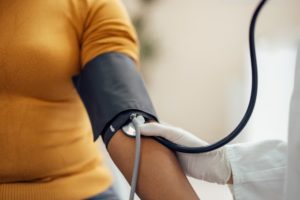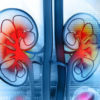What Is Hypertension?
 Hypertension is a condition that affects the body’s cardiovascular system. With high blood pressure, the force of the blood pushing against the artery walls is consistently higher than normal pressures, resulting in the heart needing to work much harder to pump blood.
Hypertension is a condition that affects the body’s cardiovascular system. With high blood pressure, the force of the blood pushing against the artery walls is consistently higher than normal pressures, resulting in the heart needing to work much harder to pump blood.
A patient’s blood pressure is made up of two numbers: systolic and diastolic. Systolic pressure is the pressure when the ventricles pump blood out of the heart, while diastolic pressure is the pressure between heartbeats when the heart is filling with blood. The American College of Cardiology and the American Heart Association break down blood pressure into four general categories:
- Normal blood pressure: A blood pressure that is 120/80 mm Hg 9 (millimeters of mercury) or lower
- Elevated blood pressure: A blood pressure where the top number ranges from 120 to 129 mm Hg and the bottom number is below 80 mm Hg
- Stage 1 hypertension: When the top number ranges from 130 to 139 mm Hg or the bottom number is between 80 and 89 mm Hg
- Stage 2 hypertension: Occurs when the top number is 140 mm Hg or higher or the bottom number is 90 mm Hg or higher
What Are the Symptoms of Hypertension?
Hypertension does not always coincide with visible symptoms, even if readings from blood pressure tests reach exceptionally high levels. Some individuals can experience hypertension for years without knowing it.
However, some signs a patient has high blood pressure may include:
- Chest pains
- Shortness of breath or trouble breathing
- Dizziness
- Severe headaches
- Blurry vision
- Nausea or vomiting
- Increased anxiety
- Frequent nosebleeds
- A buzzing sound in the ears
- Episodes of confusion
- Abnormal heart rhythm
If left untreated, hypertension can lead to other harmful health conditions, including kidney disease, heart disease, and stroke.
What Are the Risk Factors of Hypertension?
The causes of high blood pressure can be categorized as modifiable risk factors and non-modifiable risk factors:
Modifiable Risk Factors
- Unhealthy nutrition habits: Diets high in sodium (salt) cause the body to retain fluid, increasing the risk of high blood pressure.
- Physical inactivity: Inactive individuals tend to have higher resting heart rates.
- Consumption of alcohol and tobacco: Drinking alcohol and smoking have been linked to higher blood pressure in patients.
- Being overweight or obese: Because excess weight causes changes in the blood vessels, the kidneys, and other parts of the body, poor weight management can lead to hypertension.
- Stress: Stress levels have been linked to temporary increases in blood pressure.
Non-Modifiable Risk Factors
- Family medical history: Patients are more likely to develop hypertension if a parent or sibling suffers from the medical condition.
- Age: The risk of high blood pressure increases with age.
- Race: Hypertension is more common in some races compared to others.
- Existing chronic conditions: Existing medical conditions such as kidney disease, diabetes, and sleep apnea, can lead to high blood pressure.
How Is Hypertension Diagnosed?
To diagnose hypertension, a primary care physician will ask patients about their medical history and their noticeable symptoms. Medical providers will also listen to the patient’s heart using a stethoscope.
A blood pressure test is then administered to determine whether a patient has higher-than-normal blood pressure readings. It is common for healthcare providers to measure blood pressure in both arms to get the most accurate reading.
If it is determined a patient has hypertension, providers may recommend additional testing to better determine the cause. Other tests may include:
- Ambulatory monitoring
- Lab tests
- Echocardiogram
- Electrocardiogram (ECG or EKG)
Can Hypertension Be Treated?
While there is no specific cure for high blood pressure, there are actions patients can take to help manage their condition. Lifestyle changes patients can make to help lower high blood pressure include:
- Eating a healthy, well-balanced diet that is low in sodium
- Quitting smoking
- Increasing time spent being physically active
- Remaining at a healthy weight
Physicians might also prescribe medication for patients with high blood pressure, depending on their blood pressure goals and other health conditions.
Receive Expert Care at Bergen Medical Associates
Located in northern New Jersey and serving patients throughout the region, Bergen Medical Associates offers in-person and telehealth visits to care for a variety of medical conditions, including hypertension. The internal medicine team takes pride in providing state-of-the-art treatments and using the latest techniques and equipment, all while preserving the old-fashioned values of patient care. Contact Bergen Medical Associates to learn more about hypertension treatment or our other specialties.











